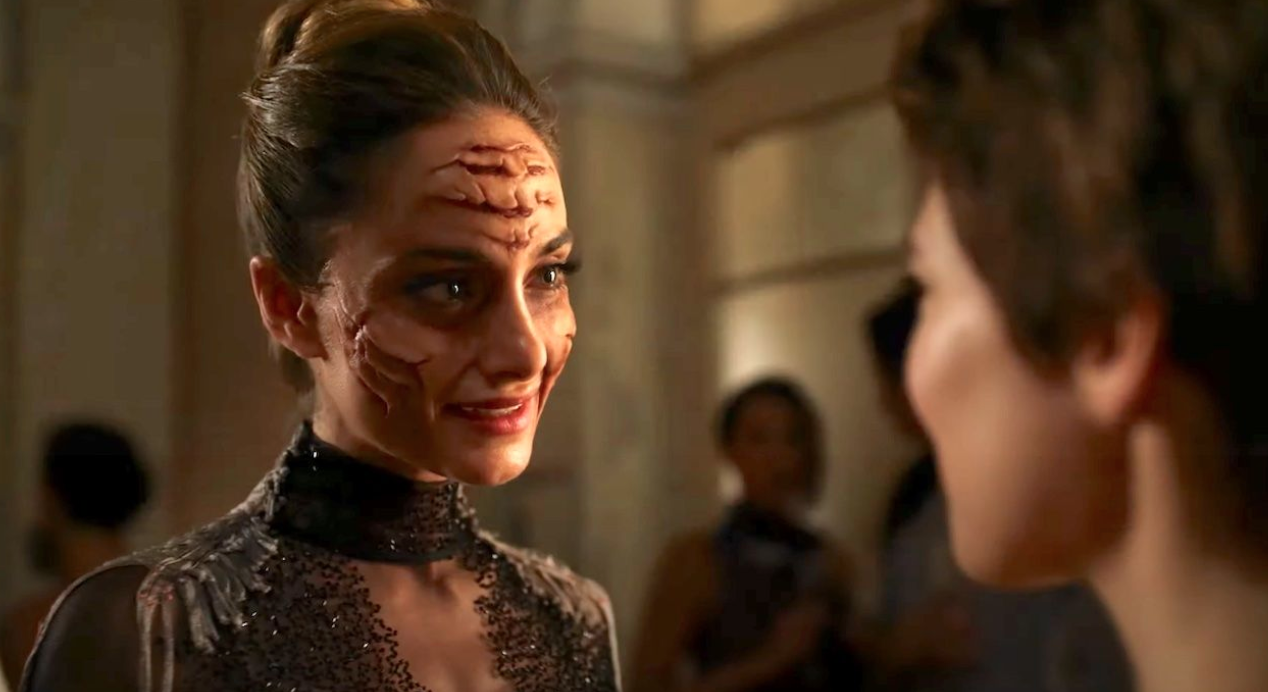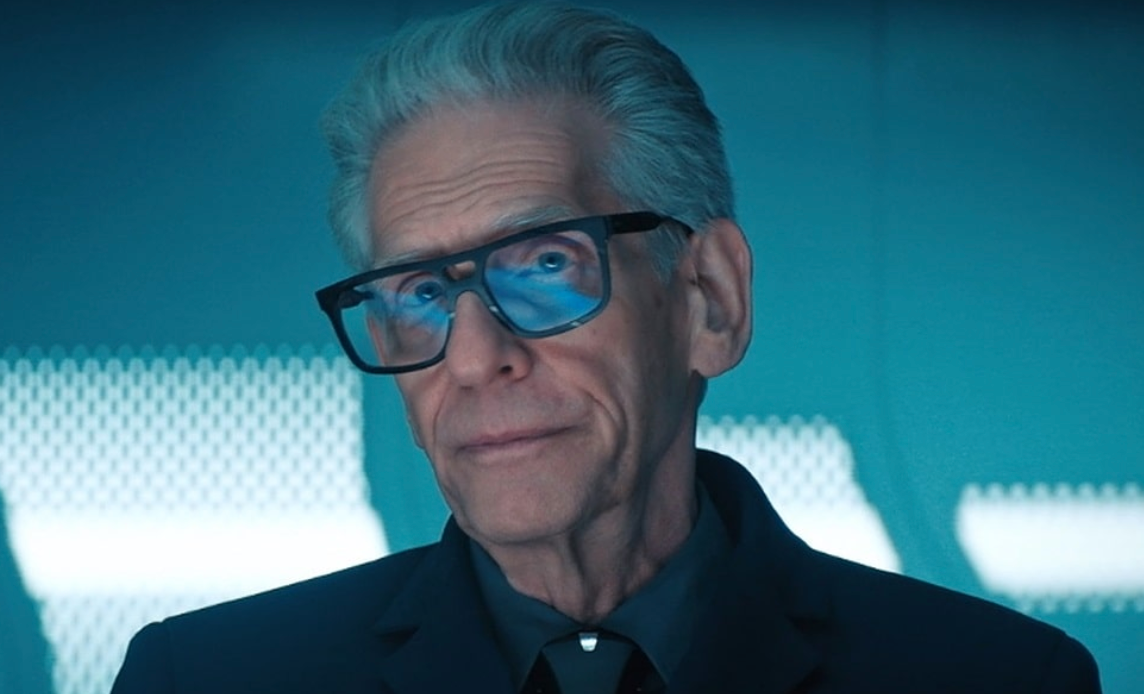David Cronenberg is one of the few Jews I view as having contributed to Western culture in a way that is not completely destructive. That said, it must be noted that if Jews offer meaningful commentary, they are only offering that meaningful commentary on phenomenon that is so Jewish that it would not exist in a society that didn’t have Jews.
This is to say: “some Jews may slightly dull the impact of Judaism.” It’s hardly a net positive.
I’ve been looking forward to Cronenberg’s return to his roots with the recently released film “Crimes of the Future.” This is not to be confused with his 1970 low-budget film “Crimes of the Future,” which was sick. The new film seems to have been named this to signal similar themes (or perhaps it was just too good of a name to waste on the 1970 film).
After reading about the film’s wide release last week, I broke down and watched the trailer, and realized that I might not be able to watch the film. It is just too dark. I don’t think the trailer is too much, but I know what this will mean the film is.
I’m sure it is more than horror. I’m sure there is a commentary about the human condition being degraded by unrestricted sexuality and technological development, and this ultimately leading people into a dark and satanic place where they are separated from the core notions of what it means to be human. But it is clear that the film is so ugly that the social commentary probably isn’t worth it.
I understand this impulse. I’ve used shock vulgarity and detailed descriptions of homosexual acts that make people squirm for the purpose of making people look at something ugly that they would rather ignore. This film seems to go beyond Videodrome and zoom in on the modern phenomenon of transgender surgeries, probably not without grandstanding a bit over the fact that Cronenberg predicted that the separation of body and mind would eventually lead to these kind of grotesque atrocities. Certainly, the transgender surgeries are something I’ve described in more detail than people would like, so a graphic film criticizing them is not something I’m in a position to complain about.
The first Cronenberg film with this title was made in 1970 and took place in 1997. It was about a type of women’s makeup that caused a plague that killed all women past the age of puberty. It was an extremely dark film, and much too French to really be especially watchable, but it was again dealing with themes of hypersexualization associated with modernity that this new Crimes film plays on.
Last month, libshit journalists walked out of a screening of the new film because it was too gross. It makes you think: all of these people promoting trannies should be forced to first attend a tranny genital mutilation surgery. At the very least, they should be forced to look at the results of these surgeries. It’s just like these liberal women cheering on the rainbow flags without ever thinking about a man in a BDSM dungeon with another man sticking his hand into his intestines. It’s all just fun and games when you don’t have to actually see what you’re promoting, and instead associate it with a false media representation of the thing. Journalists walking out of a film that presents analogies about tranny surgery is pretty on the nose. Insofar as any of the “hip” audience exposed to an art film like this is capable of understanding the themes, I’m sure it’s a net positive. Visuals can be powerful, and in art, you’re still allowed to present some interesting themes if they are sufficiently obtuse.
I personally already know about the tranny surgeries, I already understand that the long-term effects of exposure to technology will continue to lead to grotesqueries beyond our imagination, and I get the Lovecraftian analogy of humanity being subsumed by a supernatural evil it is enthralled by but has no ability to understand, and this leading to an apocalypse. I’m not sure I can gain anything from watching this film.
At the same time, I do feel as though I am in some way obligated to see this film. It’s a kind of personal artistic obligation. Watching Cronenberg’s original body horror films as a teenager (they were already old), I just wanted to watch some spooky, gross materials. As I aged and started to develop a real understanding of the world and the human experience, these images from Cronenberg stuck in my mind. Videodrome was particularly powerful and relevant to understanding the profanity of the relationship between technology and human souls. When looking at the hunched back of people who use their phones all day, and realizing that their addiction to this screen had actually malformed their skeletal system, I thought of the images of James Woods with the mutant growths on his body caused by his enchantment with the evil TV station. If there is a more prescient vision of the end road of the parasitism of technology, I’ve not seen it.
It is appropriate to have Crimes released at the onset of “gay pride month.” We now think of trannies as the core body mutilators, but normal homosexuals mutilate their anuses, most of them wearing diapers for the rest of their lives after a few years involved in the gay lifestyle. Gays were also some of the first people to be heavily involved in tattoo and piercing culture. As far as technology, they were also some of the first involved in pornography. Further, their entire lifestyle is dependent on medical technology, as without it their lifestyle is impossible. People will try to claim that homosexuality existed in history, and this is basically just a lie. Homosexual acts existed in history, usually involving a man and a pubescent boy. The modern phenomenon of large groups of adult men gathering at parties to sodomize each other, and turning this into a lifestyle – which is the definition of “homosexuality” – did not exist anywhere in history because of the rapid nature of disease spread and the threat to the immune system. Furthermore, the “bathhouse” phenomenon wasn’t possible in a Christian society, which is why it only emerged first in San Francisco, which had been decimated by hippies, and then in New York, which had been decimated by Jews. Homosexuals view their bodies as instruments of pleasure, and their lives as purely the pursuit of pleasure, and this is why they end up in such dark places.
Cronenberg is 79, but he is my pick to direct an adaptation of a Michel Houellebecq novel – probably The Elementary Particles, but The Possibility of an Island or even The Map and the Territory would work as well (although the latter would be difficult, since Houellebecq would have to play himself and is clearly an impossible person). Cronenberg is the only filmmaker who has dealt with these themes of the ugliness of personal indulgence in a meaningful way. That said, Houellebecq is likely too direct and forceful in his beliefs to appeal to Cronenberg, who leaves very vague his own personal opinions on the things he critiques.
As to my key point: there are actually many instances of Jews criticizing Jewish values. Most obviously, you have the consistent attacks by secular Jews against the values of religious Jewish communities. But you also have many examples of criticism of secular Jewish values, such as their various weird revolutionary agendas, or outright attacks on the Jewish character. In many ways both Woody Allen and Larry David can be seen as critics of the Jewish character; their work can be seen as critical self-analysis, but they are both so Jewish that they can’t criticize themselves without critiquing the Jewish racial soul. Furthermore, they both mention their Jewishness so often that it is impossible not to view their work as a commentary on Jewishness as a whole. Perhaps much more relevant than that is the critiques of communism by Jewish libertarians. That was a phenomenon that started very early after communism started. And of course, Karl Marx himself criticized Jewish bankers. You now have Jews leading social conservatism movements.
The point to understand is that this is what Jews do: they criticize and tear things down. That is the core of their character. So of course they are going to criticize the agendas of other Jews. The thing is: this does not even itself out. The Jewish critiques of Jewish agendas are much rarer than the Jewish critiques of our own religion and culture. What’s more, a critique being critiqued does not bring you back to where you started. It’s not a negative plus a negative equaling a positive. Jewish critiques of Jewish ideas always lead in some other weird Jewish direction, and on the whole you can see that even the critiques of Jewish concepts presented by Jews feed a Jewish cultural ecosystem, while also allowing Jews to lead multiple sides of cultural narratives. I don’t really think this is a conspiracy, per se – that is, aside from obvious exceptions, I don’t think the Jews criticizing other Jews view themselves as working in tandem with those they are criticizing to dominate the culture, but this is nonetheless the obvious result of this behavior pattern.
Understanding this dynamic was something that really helped me to understand the Jewish problem. When you speak to conservatives, they will often admit “most Jews are liberal, but…” and then point to some specific Jew they follow who is a “proud Jew” but not a liberal. It’s easy to fall into viewing Jews as just a group of people raised in the same religion and culture who all have different ideas. Clearly, some of them do have different ideas, but the approach is always the same – it is always this crafty deconstruction through systematic, legalistic critique, which can ultimately be reduced to exploitation of language to deflect away from core concepts. Most people won’t be able to grasp this phenomenon, which is why I think for the popular masses, portraying Jews as anti-Christ is much more useful. This is not hard to do – the “conservative Jew thought-leader” Ben Shapiro is on tape slandering Jesus Christ as a common criminal who got what was coming to him. But for people seeking to lead others, a broader underlying understanding is necessary.
Cronenberg clearly fits into this model of a Jew criticizing for criticism’s sake. All of the Jewish filmmakers I like probably fit into this model, with the exception of possibly Stanley Kubrick. Cronenberg is criticizing certain elements of sexual dysfunction and its relationship to technology and urbanization, but he’s not offering some traditional mode of living to replace this, or even making any value judgement. In fact, if you listen to him talk about it, he basically says that he doesn’t really care so much that technology is transforming humans, he just thinks it’s interesting. He rarely comments on the prominent sexual themes in his films, but I’m sure he would say the same thing about those. This concept, put forward in Crimes of the Future, of purposefully mutilating your own body for sexual satisfaction is so obviously paralleled by these transgender people that I don’t think Cronenberg would try to deny that. He’s an old man, Jew or not, so he probably wouldn’t be bothered by saying that the real life surgeries are as grotesque as those in his film, but he would then claim he can’t judge the transgenders and thinks they should be allowed to do whatever they want. He might even argue that “ugliness is a value judgement,” and that everyone has their own perceptions of beauty and ugliness, and claim that it is only my bodily perception that views his films or the tranny mutilations themselves as grotesque. If you asked him about the tranny suicides – which result from the same pain that his characters experience as a result of body horror – he would probably just shrug.
Note: In the above paragraph, I’m extracting an intent that hasn’t been explicated by the artist, which is typically not appropriate. However, along with watching his films, I’ve watched enough of his interviews to have a good idea of how he thinks about these things. You can also gather a lot about how he thinks from examining his physiognomy.
In some way, due to the lack of any force behind the critique, you could certainly argue that all Cronenberg has done is make ugly films with no redeeming qualities. As I said above, I think there are redeeming qualities to his films; while there might not be force behind the critique, there is weight in simply pointing at these things. If the perception is left to my personal body, then my perception is that Cronenberg is artistically portraying the deep ugliness of our society, and that people who see this ugliness in his films should want to change society and remove this ugliness. It doesn’t really matter if he’s placing a value judgement on it, because I am, and as a believer in God and the order of nature, I believe that my value judgement can be defended as objectively correct. In general I see no reason not to use Jewish critiques of other Jews whenever they are useful. You just must remember how this whole system of Jewishness works and not get sucked into it.
I will decide in the future whether to commit the crime of watching this film. As I say, I think I’m obligated, but I don’t feel I need to watch its gay pride premiere. I will probably need to work myself up to it. If and when it happens, you will be the first to know, dear reader.




